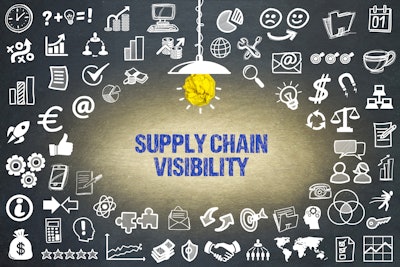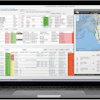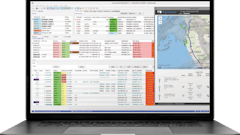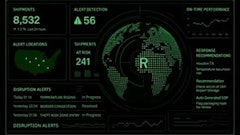
In today's volatile global marketplace, supply chain disruptions have become the norm rather than the exception. While traditional track-and-trace capabilities were once revolutionary, they now represent the bare minimum of what businesses need to stay competitive. Simply knowing the location of assets is no longer sufficient. Logistics providers who transform raw location data into actionable intelligence gain the ability to make smarter decisions, predict potential disruptions before they occur, and unlock new levels of efficiency across increasingly complex supply networks.
From visibility to intelligence
The evolution from basic visibility to comprehensive intelligence represents a fundamental shift in how we approach supply chain management. Modern integrated platforms now harness real-time data to enable precise milestone management, accurate ETAs, and comprehensive sustainability reporting.
This shift is particularly crucial for enterprises managing complex carrier networks. According to research from TEG, only 33% of third-party logistics providers currently utilize e-sourcing technology when managing these networks, highlighting a significant opportunity for digital transformation across the sector.
Security in an era of collaboration
As warehouses and fulfillment center become increasingly busy, security concerns have grown proportionally. The collaborative nature of logistics creates vulnerability points where fraudulent activity can occur.
Digital identity verification has emerged as a critical safeguard. Solutions enable loads to be assigned to specific drivers with verification checkpoints throughout the supply chain. These systems require biometric verification and QR codes attached to digital identities, dramatically reducing the potential for fraud and theft.
Transforming data into a strategic advantage
The most sophisticated logistics platforms today offer more than just location tracking – they provide operational status in real-time. Carriers can broadcast their status (on a job, available, returning home) alongside their current location, creating unprecedented operational awareness.
This detailed information allows businesses to make tactical decisions with confidence. Rather than wasting time attempting to source carriers that aren't in the area or unavailable, logistics managers can focus their efforts on providers with high availability probability.
Intelligent load-matching algorithms can automatically notify relevant carriers within a target radius of a job, eliminating the manual process of calling, chasing, and sourcing, transforming operations from reactive to proactive.
Meeting sustainability goals through intelligence
One of the most compelling applications of this intelligence layer is in sustainability reporting. By combining location data with vehicle compliance information, modern platforms can accurately provide Scope 3 emissions data, helping enterprises report metrics to their customers.
This visibility creates a framework for strategically reducing CO2 emissions by utilizing carriers close to collection points or those already on return journeys with empty trailers. As environmental regulations tighten globally, this capability is becoming increasingly valuable, with two-thirds of 3PLs now identifying sustainability as a pressing procurement challenge.
The new consumer-grade experience in B2B
The expectations set by consumer e-commerce have migrated into B2B supply chains. This shift drives the need for enhanced visibility across all transportation modes.
Modern platforms enable loads to be tracked via third-party telematics or through mobile applications. This data can be integrated via API into enterprise customer portals, allowing businesses to provide first-class service with complete freight visibility and eliminating surprises when delays occur.
The role of freight audit in modern visibility
A critical but often overlooked component of supply chain intelligence is automated freight audit. By digitizing this historically manual process, businesses gain unprecedented visibility into cost drivers while improving efficiency and accuracy.
Advanced freight audit tools ensure billing accuracy by addressing order discrepancies. In fact, some freight audit tools achieve savings through precise matching and error resolution. Beyond the immediate financial benefits, this creates a level of transaction transparency that strengthens partnerships between shippers and carriers.
Looking forward
As we look to the future, supply chain intelligence will continue to evolve from a nice-to-have feature to a must-have capability. Organizations that successfully harness this intelligence will gain competitive advantages through lower operational costs, improved carrier utilization, enhanced security, and verifiable sustainability improvements.
The most successful supply chain leaders will be those who recognize that the journey from visibility to intelligence isn't just about technology implementation; it's about transforming how we think about, manage, and optimize logistics operations in an increasingly complex global environment.


















